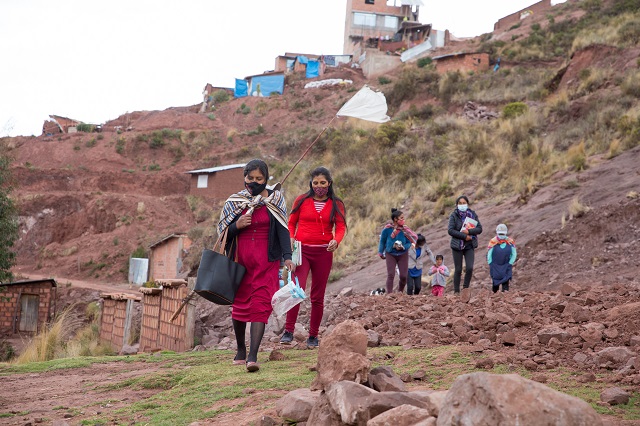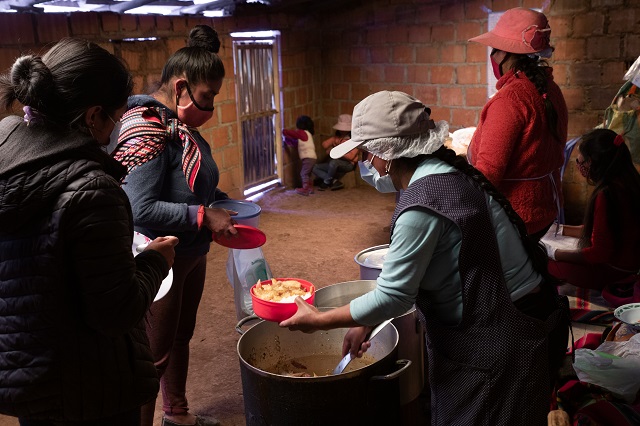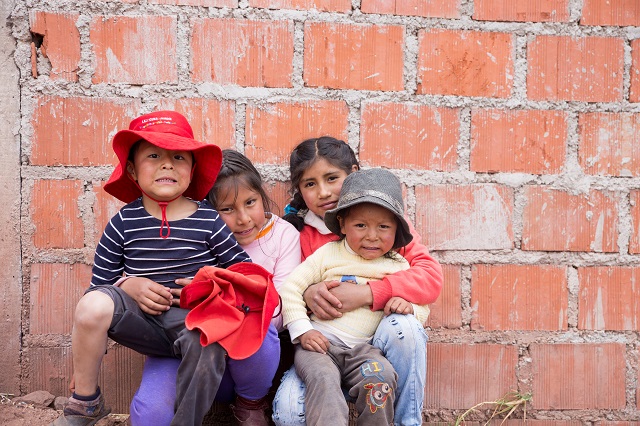Resilience Against Crisis in Peru

The rights of children to education and a healthy meal are under threat in the remote village of Nueva Ciudad Inca in Peru. But residents chose to take action, turning a symbol of surrender into a symbol of resilience.
The white flags that waved outside homes across Peru in response to the COVID-19 lockdown measure flew for months. Poor families put them up as a cry for help, a symbol that they had no more food.
What started in the slums of Lima spread to hundreds of communities around the country.
But in the village of Nueva Ciudad Inca, in Peru’s Andes mountains, this symbol of surrender became a symbol of resilience.

Seeing numerous white flags made from bags and broomsticks hoisted around their community, six women organized a soup kitchen to help their fellow residents. They called it Olla Solidaria (the Solidarity Pot).
“We made Turkish rice, but without meat or chicken, because we didn’t have any,” recalls 13-year-old Emilio of their opening day in May. Emilio*, whose mother was one of the founders, tells me proudly he helped by knocking on doors to tell townspeople they could get a whole meal for just one Peruvian sol (20 US cents).
On a typical day during the lockdown, volunteers, mostly women, manage to feed more than 150 children and 100 adults. Today, they run the soup kitchen out of a neighbour’s house. On the wall hangs a paper showing volunteer shifts and the week’s menu: today, pumpkin stew; tomorrow, cheese salad. A local company donated utensils and some huge pots. The women cook outside with wood because they cannot afford gas to cook indoors. When the food is ready, they take the pots inside to serve neighbours who have been queuing since noon.
The small community of Nueva Ciudad Inca reflects the reality affecting children and families across Latin America. An estimated 28 million people in the region are living in extreme poverty due in large part to the worsening economy brought on by COVID-19 measures, according to the Economic Commission for Latin America and the Caribbean (ECLAC). Children are the worst affected, with their education, health and nutrition at risk.
The lockdown earlier this year left more than a third of Peruvians without food, and many families still struggle to recover. Just as in Peru’s economic crisis and hyperinflation of the 1980s, soup kitchens have emerged as a response, organizing themselves to eat in group and stretch food resources.
As a response to the COVID-19 crisis, SOS Children's Villages Perú supports 18 soup-kitchens and 17 community kitchens nation-wide. In addition, the SOS Peru team keeps in constant communication with participants and runs workshops to develop organization and leadership skills of those on the soup-kitchens’ board.
The Solidarity Pot
While I photograph the soup-kitchen cooks, Lorna (9) looks at my camera with curiosity. She tells me that her mother takes weekly shifts at the soup kitchen with other women to cook and do grocery shopping. "Although I see her less those days, I am proud that she helps other children like me not to go hungry," says Lorna* as she carries a container of food for herself, her mother and her little brother.
Mónica Bustos, SOS Children’s Villages social worker, says the daily number of servings vary and that it has dropped as more families recover. But when looking at the daily queues, it is obvious the need persists. What I saw is that children depend most on the soup kitchen, coming here for a meal while their parents are out working or looking for work.
For many kids like Emilio and Lorna this will be their only main meal of the day, replacing the one they typically would get in school.
Unfortunately, the soup-kitchen board can only afford one daily meal.

Choosing between education or food
Many families moved to Nueva Ciudad Inca from the nearby city of Cusco to fulfil their dream to have a home of their own. But the green mountains and peaceful environment have been overshadowed by the lack of promised basic services – electricity and water – which local officials have yet to deliver.
Emilio visits his mother and two younger siblings in Nueva Ciudad Inca on weekends. Since schools closed for in-person learning, he has lived with a relative in Cusco so that he can follow online classes. Without electricity and without cell phone service, he had to go up to a bodega which is the only place in town with electricity. He paid two soles (40 cents) to charge his phone and then went up a hill where he had service to receive his homework via Whatsapp.
“Here I was freer, I could run and play. In the city I feel locked up,” says Emilio, as he combs his hair and puts on his cap. “But since I want to study to become an engineer or a lawyer to help my mother and my community, I had to go."

Lorna does not have the same option. After proudly showing me her two puppies in her backyard and telling me that she dreams of becoming a veterinarian, she guides me back to the soup kitchen. She was with me all day, so I asked her how she keeps up with her schoolwork. She says her father takes the only cell phone to work from Monday to Friday, so she can only do her homework on Sundays. “Sometimes my aunt lends me her phone, but I'm ashamed to ask for it too much.”
Families must choose if they eat, or if they buy credit for the cell phone (or charge it), so the children can follow their online classes. For girls like Lorna that is the only way she can continue her studies.
The school year ends in December and they will have two months of summer vacation, but compared to other years, Emilio and Lorna look forward to going back to the classrooms at the beginning of March. Emilio is looking forward to living with his siblings and mother again, and Lorna is excited to start learning at school.
“In school I was getting smarter, I want to go back,” Lorna adds.
A plate of food for every child
Today the women who run the soup kitchen are seeking to turn it into a community-kitchen, so they can receive a monthly budget from local authorities and guarantee it would continue. But they find it is a very bureaucratic application. Amidst a political crisis, thousands of soup kitchens in Peru await a long overdue legislation to be passed by Congress to speed up this process as a response to the emergency.
Despite this long wait for the government’s support, a small community like Nueva Ciudad Inca takes action and faces crisis with solidarity and resilience.
While talking to women and children lined up outside the soup kitchen holding empty bottles and containers to bring food back home, everyone finds a silver lining. They appreciate that they know each other better now, they know the names of their neighbours and that they can support each other. At least now, every child has something to eat.
*Names changed to protect the privacy of the children
Canadians wishing to help vulnerable children are encouraged to Sponsor a Child, Sponsor a Village or make a Donation today to our COVID-19 response.
